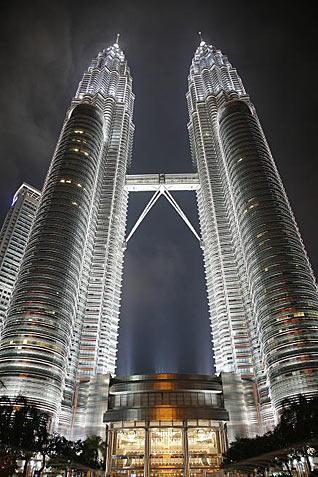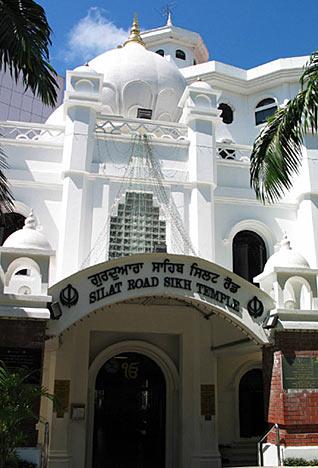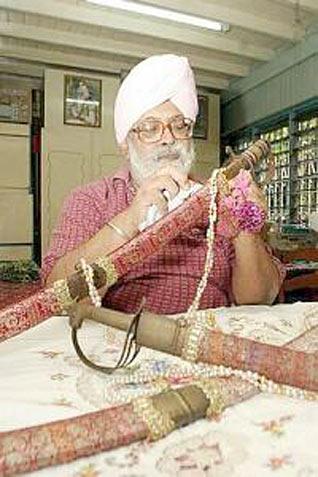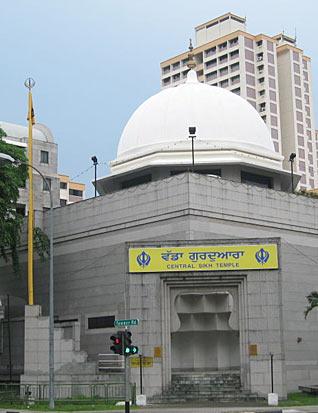Books
The Enchanted Prison
A Review by NEW STRAITS TIMES
Sometime in the 1920s, a widower farmer from a village in Punjab travelled to Malaya with his son and daughter, seeking a better life and fortune.
Arjan Singh ended up in Rawang and found himself making a laborious living by breaking charcoal for the furnace in a powerhouse.
In his spare time, he reared cattle.
His son, Bachan Singh, would later move to Prai to work as a labourer in the pier, and his daughter-in-law, Balwant Kaur, would tend the herd in Kampung Teluk.
Little did Arjan suspect then that his struggle would one day be told to the world by his own grandson, through a scholarly work of literature.
The Enchanted Prison, a novel by Malkiat Singh Lopo, chronicles the early hardships, predicaments and successes of the Sikhs who, like other communities, helped propel Malaysia to the modern industrialised land it is today.
"We had a tough life," recalls Malkiat, 65, of his family's past.
"Our early generations suffered. So they knew education was important. That is why their children progressed rather fast."
Based on historical facts, The Enchanted Prison expresses in a fictional plot the conditions in India and Malaya from 1873 to 1937.
"Malaya was the first country outside the Indian subcontinent that Sikhs emigrated to," the retired school teacher explains at his home in Seberang Jaya, Penang.
"It was referred to as the golden cage or a heavenly prison. It was a prison because one was so enchanted by this foreign country that you were unable to return to your own homeland."
Malkiat's book describes how early immigrants underwent a transformation through an emotional process of attachment that made them devoted to Malaya.
"When the first ones arrived here, they viewed Punjab with nostalgia and longing. But when they returned there years later, it had become a strange country!"
Most of the early Sikh immigrants were needed by the British colonial government. While many belonged to the army and police, a steady stream of other occupations also grew - milkmen, cattle farmers, guards, craftsmen and tailors.
Through fiction, Malkiat recreates a bygone universe borne out of a deeply endeared imagination. There is a keenness for detail that makes the old world come alive in the mind of the modern reader.
The novel is replete with images - the steam journey from Calcutta to Rangoon to Penang; the bachelor's kongsi for contract workers; the labour work they undertook; their common kitchen; the activities at the railway; the expansion of roads and the building of houses.
Through such images, Malkiat brings out the ethos of the pioneers and their very experiences for the current generations of Malaysians.
Though specific to a particular ethnic community, the novel is easily one of the most insightful works of historical literature to have come out of Malaysia in the last few years.
Malkiat has an intimate grasp of the idiosyncrasies and mores of the early Sikh explorers in Malaya's rural frontiers.
Ironically, Malkiat has never set foot in Punjab. Despite this, he has authored several books, including the "Sikhs in Malaysia" series, which he co-wrote with his wife, Mukhtiar Kaur.
Malkiat has always known there is no commercial revenue forthcoming from his research.
In fact, The Enchanted Prison was originally written in 1972, but was not published due to lack of funding until recently, when his old friend, Hari Singh, took up the project.
"It is a labour of love," says Malkiat.
Malkiat used to write for the Singapore-based Punjabi paper, Navjiwan Weekly and the Kuala Lumpur-based Pardesi Khalsa Sevak - both now defunct.
When the latter closed in 1960, he began writing a column called Lopo Kalam ("Lopo Writes") for Malaya Samachar, the only local Punjabi periodical.
Known as an eccentric, his collections of old photos, patchwork quilts and traditional dolls have been displayed in exhibitions around the country.
"I have even compiled about 2,000 words from the Malay language that are also used in Punjabi," he says proudly.
Absorbed by Punjabi folk songs ("the vocabulary is inspiring, the music can move you"), Malkiat is planning a major project for next year - the third centenary of the installation of the Guru Granth Sahib, the holy book of the Sikhs.
Large portions of his novel are engrossed with elaborate descriptions of weddings and even a couple of funerals - all serving to show the vibrancy of the culture then with its unique traditions, fashions and cuisine.
What makes the work particularly precious is that its fiction is craftily condensed as a commentary of major historical episodes of the period. Malkiat weaves real incidents, both well-known and obscure, into an imaginary plot.
Even as it alludes to the glories of the old Sikh kingdom in India, the book dispenses much readable information - with real anecdotes and accounts - on facts relating to subjects like the Malay States Guides, tours by Sikh elders and freedom fighters to Malaya, journals and accounts left by travellers from that era, and the politics that took place around it all.
A sequel, which deals with the period 1937 to 1955, is in the offing. Malkiat calls it an "adoption period" that was affected by Punjab's partition between India and Pakistan, and the prospects of Merdeka (Malayan independence from British colonial rule).
In February, he suffered a third heart attack. The hospital he was warded at for a whole month was teeming with a steady stream of well-wishers.
"They are more than blood relations," he says of his old friends. "They are leftovers from a generation that is slowly diminishing."
* * * * *
FACTS ABOUT MALAYAN SIKHS, as gleaned from THE ENCHANTED PRISON
Malaya was the first foreign country that the Sikhs from Punjab emigrated to. This was precipitated by the death of the legendary ruler, Maharaja Ranjit Singh, in 1839, who reigned over the last kingdom on the sub-continent not under British control. Aided by the treachery of the Dogra generals originally given employment by Ranjit Singh, the British annexed Punjab in 1848. Eyewitness accounts extolled the bravery and heroism of stalwart Sikhs who fought the British. Viscount Gough, the campaign commander, regarded the Battle of Sabraon (1845) as the Waterloo of India. Govenor-General Viscount Hardinge noted: "Few escaped; none, it may be said, surrendered. The Sikhs met their fate with the resignation which distinguished their race." Malkiat Singh Lopo adds: "The loss of the Sikh Empire is not forgotten till today."
1 A key freedom icon of Punjab, Bhai Maharaj Singh, and his disciple, Kharak Singh, were exiled by the British to Singapore in 1850. He was kept in a windowless dungeon at the Outram Road Prison, where he died six years later. A samadhi, or memorial, was built at the place of his cremation - which became a holy place for his followers. He was believed to have saintly powers, and the locals refer to him as keramat-wala (the "Miracle Worker"). A year later, Kharak Singh was seized on the orders of Lord Elgin, taken aboard a gunboat and sent to Penang. The Samadhi of Bhai Maharaj Singh now constitutes part of the Silat Road Gurdwara in Singapore.
2 In 1915, as a result of efforts by the revolutionary Ghadr Party in California, the Indian troops stationed in Singapore mutinied against the British. Articles and poems on revolution were widely circulated in secret. The British managed to quell the mutiny, but there was mass desertion from the regiments. Soldiers fled by crossing to Johor. They received a lot of help from railway construction workers along the way, and others who provided food, clothing and cash for them to return home. Apparently, the escape was much easier for the Punjabi Muslims who easily blended with the local Malays. Some Sikh troops had to disguise themselves by shaving off their long hair and beards to avoid being captured. Most escaped to Siam.
3 As the Sikh population on the peninsula rose, a unique service established itself in railway towns like Taiping, Kuala Kangsar and Tanjung Malim. It became a common sight to see Sikh men with milk churns standing on the railway platforms, giving away free heated fresh milk. It was normal for travellers from India to use the train to reach their destinations in Malaya. Giving food and drinks to any musaffir ("traveller") is highly regarded as a religious duty in Sikhism. So these men would spend their time voluntarily to give milk to any needy child or adult, whatever the race or religious affiliation. Their services were much appreciated because the use of tinned or powdered milk was alien to many children then. Wealthy Sikh cattle owners gladly donated their extra milk for this purpose. Some Sikh individuals even spent their time giving away cooked food to travellers.
4 Taiping was the headquarters of the Malay States Guides (MSG), a body of local Indian troops which formed Malaya's own regiment. In 1873, the Orang Kaya Mantri of Larut, Dato' Ngah Ibrahim, was worried about rivalry between Ghee Hin and Hai San Chinese clans in the tin-mining region, and wanted fighting men from Punjab to maintain law and order. He consulted Captain T. Speedy, who formed the 1st Battalion Perak Sikhs, which originally comprised 110 men of Sikh, Hindu and Pathan origins. This battalion became the MSG in 1896. During the First World War, the MSG regiment was mobilised to serve in Aden. It was disbanded when the war ended, and its men not brought back to Malaya.
5 The early Sikh community in Malaya produced a string of prolific writers. In one book, Maha Jang Europe ("Great European War") 1914-1918 AD, the writer, Havildar ("Sergeant") Nand Singh, vividly described the daring exploits of the Malay States Guides in Aden when they fought the Turkish forces. The book was written in a poetry form called kissa that could be sung or lyrically recited. Another writer, Gurbaksh Singh Kesari, the police granthi, published about seventy booklets through the generosity of Subedar Bahal Singh JP of Kulim. Gurbaksh's Panth Jagawan ("Path of Awakening") had a profound influence in awakening the masses in Punjab.
6 The largest Sikh community in Malaya by the time of the First World War was in the district of Larut and Matang in Perak. When the Malay States Guides were disbanded, the Singh Sabha, a registered local Sikh society, convinced the British Resident that the Gurdwara within the Taiping army compound belonged to the Sikhs and not the military. Once the Resident was agreeable, the Sabha performed an incredible feat of dismantling the building and re-erecting it almost intact on the present site granted by the government near the railway station. The building is today called the Gurdwara Sahib Taiping.
The Enchanted Prison is available at the office of Malaya Samachar, 2nd floor, Wisma Tatt Khalsa, 24 Jalan Raja Alang, 50300 Kuala Lumpur. Tel: 03-26930735; 012- 3690673 (Hari Singh). E-mail: samachar@streamyx.com.
[Article: Courtesy: New Straits Times, Malaysia]
Photos: Thumbnail and second from bottom on this page - the author of The Enchanted Prison, Sardar Malkiat Singh Lopo, is also a keen collector of Sikh antiques and collectibles. Top of this page - The Petronas Towers of Kuala Lumpur, the world's highest office-skyscrapers.
Conversation about this article
1: Gurmukh Singh (India), May 09, 2007, 8:43 AM.
Very insightful and interesting. To me, the article brought back many fond memories of Malaysia/Singapore from the time I was researching my book, THE RISE OF SIKHS ABROAD (Rupa & Co).
2: Gurpreet Kaur Sawhney (Vadodara, India), February 11, 2009, 1:43 AM.
I never realized how much Sikhs have done, and are doing in Malaysia. Hats off to you!
3: D. S. Tatla (Birmingham, United Kingdom), June 08, 2009, 12:55 PM.
If somebody has this book, I would like to buy it. I have tried hard to get it, but so far no trace other than this review and other tips.
4: Ranjit (Malaysia), January 29, 2011, 5:37 PM.
Try getting the book; address it to 136 Tmn Baru, Mukim 4, Jln Hussein Onn, Seberang Jaya, 13700 Perai. Penang. Malaysia.
5: Aaron Goccia (Georgia, USA), October 22, 2012, 7:26 AM.
I was able to purchase this book today from the office of Malaya Samachar, 2nd floor, Wisma Tatt Khalsa, 24 Jalan Raja Alang, 50300 Kuala Lumpur. Tel: 03-26930735
6: Rajinder Brar (California, USA), June 25, 2013, 12:44 AM.
I was born in Malaysia but currently live in California, USA. Can someone guide me as to from where I can buy a copy of this book?






